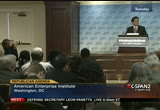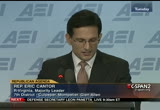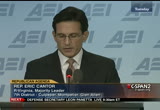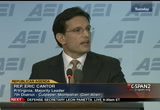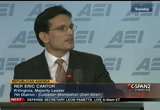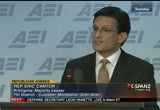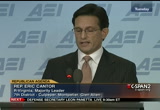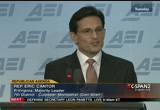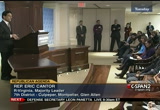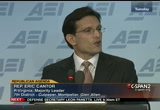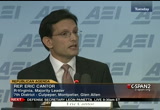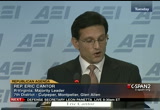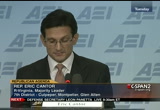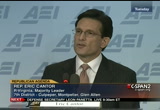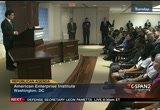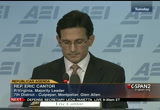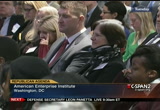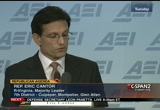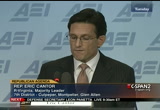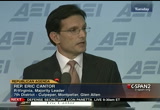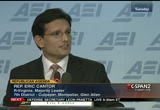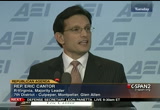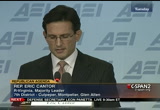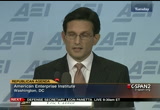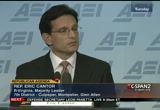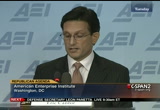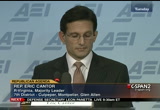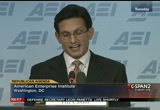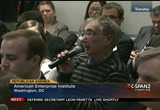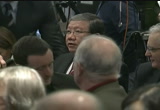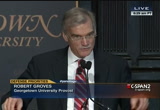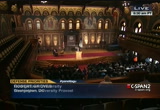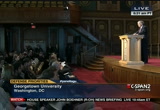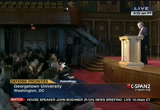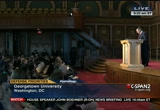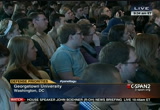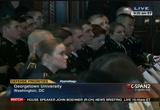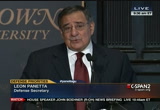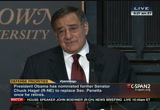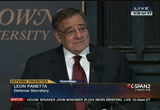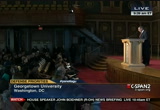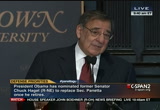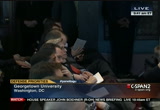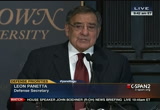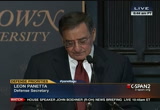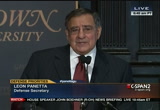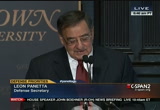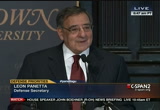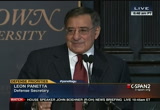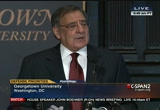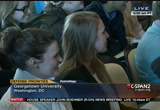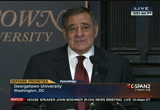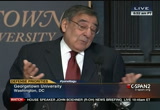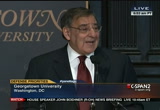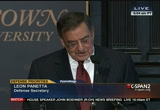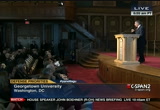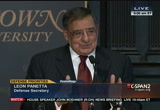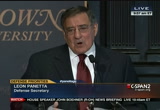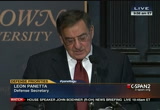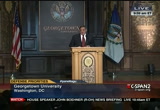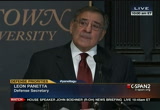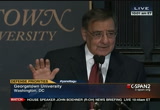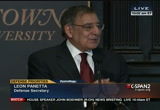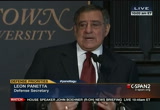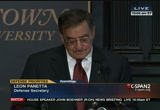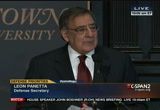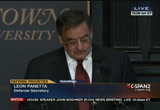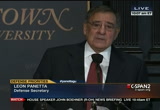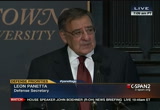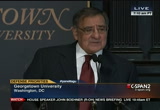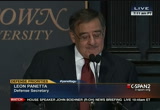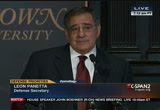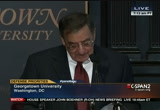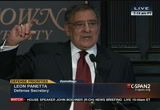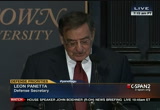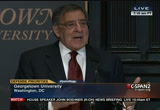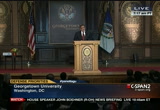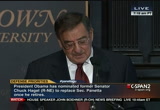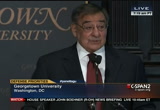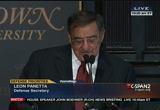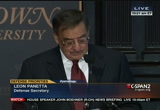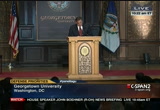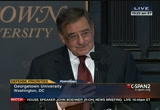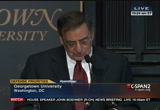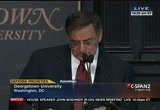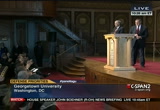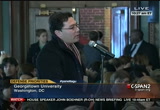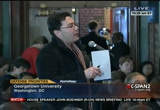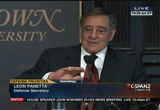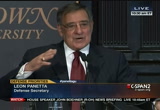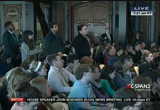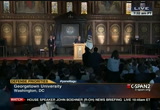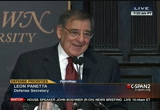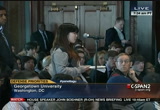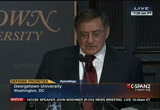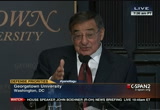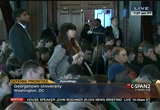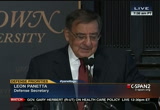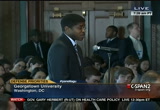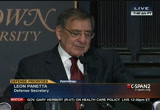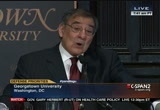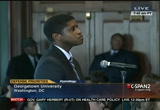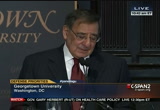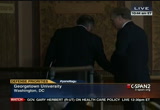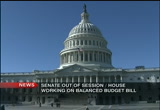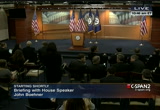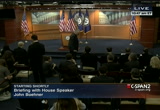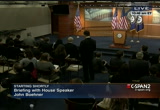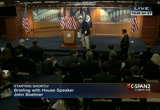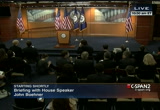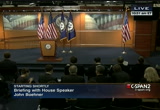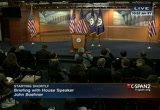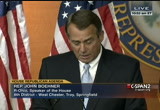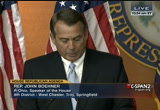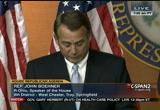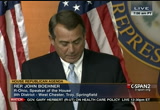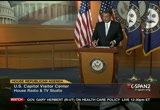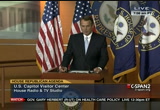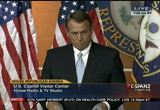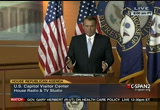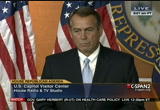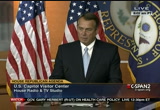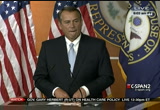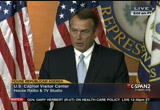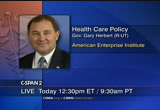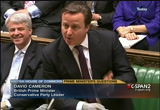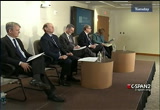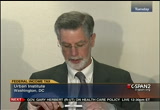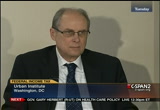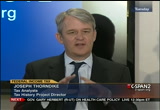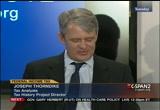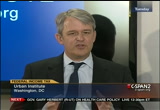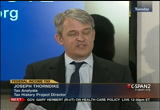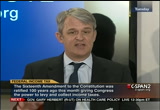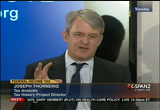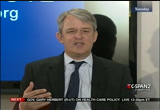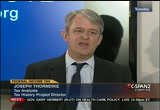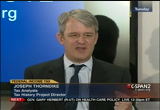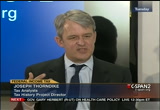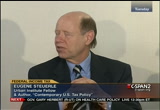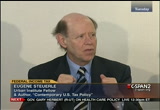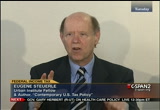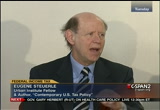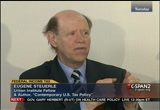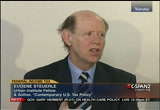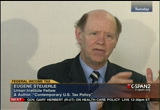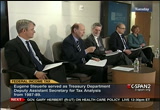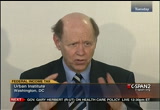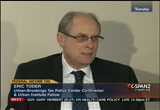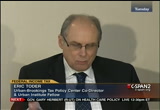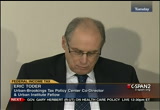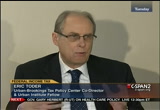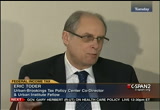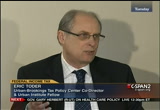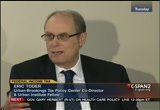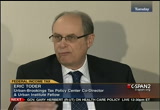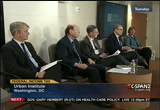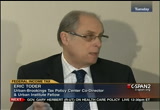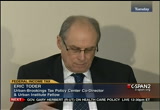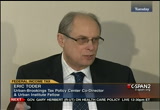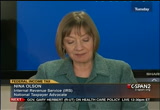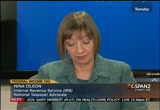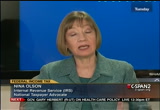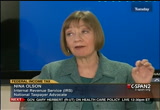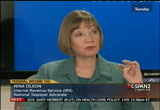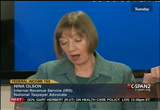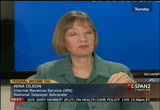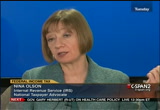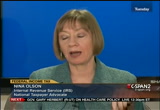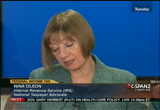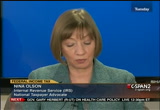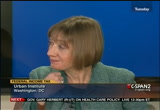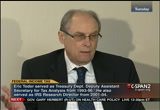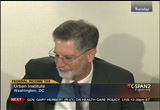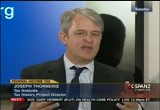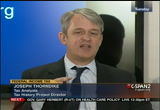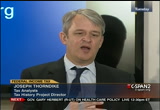tv U.S. Senate CSPAN February 6, 2013 9:00am-12:00pm EST
9:00 am
9:01 am
opportunity. i visited his school yesterday and it isn't amazing. it is making a real difference in the lives of kids who, without that school, could possibly be lost. and this is what is at stake. because now they have great teachers, terrific administered, small class sizes and a mission that said every kid has got to succeed. now, no one should deny rashawn or his sisters this opportunity. [applause] >> joseph kelley nor any parent should have to wait for failed education systems, failed school systems to get their acts together. throughout the country there are some promising signs that we can bring schools and parents together to improve our educational system. san francisco public schools adopted a funding mechanism according to what's termed a
9:02 am
weighted student formula. under this policy the more students a school attracts, the more money that school, its administrators and teachers receive. low-income students are weighted heavier and the funding forum as our children with disabilities, and those learning english as a second language. so there's incentives are schools to seek the more vulnerable population, and reasons for schools to differentiate themselves and to excel. imagine if we were to try and move in this direction with federal funding. allow the money we truly spend to actually follow individual children. students, including those without a lot of money for those with special needs, we be able to access a school which would give them a shot at having a successful life, a shot at earning their success and achieving their dream. and wouldn't be just subjected to the daily school that they were assigned to.
9:03 am
their options are to include not just public schools, private schools, but also charter schools. a competitive environment where schools compete for students rather than the other way around gives every child from the inner city of washington to the streets of los angeles an equal chance at a greater destiny. now, one of our priorities this year and a house would be to move heaven and earth to fix her education system for the most vulnerable. and when those children graduate from high school, we must expand their choices, and college has got to be an option. in 1980, the average cost of college was roughly $8000 a year. today, it is over 20,000, and less than 60% of the students who enroll in a for your program graduate within six years. clearly, something is broken. according to president obama's former jobs council, by 2020
9:04 am
would be a million and have jobs without the college graduates to fill them. while there is a persistent unmet demand of four to 500,000 job openings and health care sector alone. recent reports indicate that there are not enough skilled applicants to fill the jobs in the booming natural gas industry. now, suppose colleges provided prospective students with reliable information on the unemployment rate and potential earnings white magic. what if parents have access to a clear and understandable breakdowns between academic studies and amenities? what with those costs be? armed with this knowledge, families and students could make better decisions about where to go to school, and how to budget their tuition dollars. students would actually have a better chance of graduating within four years and getting a job. helping students realize opportunity and a career, while keeping tuition costs low makes
9:05 am
common sense. senators rubio and widen have a proposal that they unveiled right here at aei, which addresses this goal. i look forward to working with them, along with chairman john kline, enforcement legislative action in the house. over the course of this congress we also want to work reform our student aid process to give students a financial incentive to finish their studies and there. we will encourage entrepreneurship in college education, including for-profit schools. and we will fix the way we subsidize education by making the cost more transparent to parents, students, and the millions of taxpayers who will pay some of the bill. we owe it to them. now, a good education leads to more innovation. and throughout our history american colleges and universities have served as a cornerstone for the world innovation. they are a big part of why the
9:06 am
u.s. remains the destination for the world's best and brightest. investment in education leads to innovation, which leads to more opportunity and jobs for all. our problem? the investment we make is not yielding maximum returns. each year our colleges and universities graduate approximately 40,000 foreign nationals with masters and ph.d degrees, many of whom are then forced to leave the kanji because there are not enough visa slots in the immigration system to permit them to stay. so rather than being able to invent things here in america, grow businesses or start one of their own, they do all these things somewhere else. now, fiona zhou is here with us today. she is earning her master's at gw school of engineering and applied science. originally from china, she's been india united states for
9:07 am
five years, studying operations research and the systems engineering department. if you talk to her you will see, she's pretty smart. she would like to stay here. she wants to invest her talents in america, and maybe even start her own company. but she has seen too many of her friends with advanced degrees have to go home, despite sharing some of her same dreams and aspirations of wanting to become part of this country. now last year the house passed a bipartisan s.t.e.m. jobs act which helped fix this problem. we will act again in this congress, and we hope the senate chooses to join us at this time. i look forward to fiona realizing her dream, and our country reaping the rewards of her hard work and talent. whether it's college or the cost of day care, making life work for more families means reducing the economic insecurity plaguing so many working moms and dads.
9:08 am
over the last 20 years the world has changed. it used to be that one could make a career out of working for just one company. and today, the average worker stays at his or her job for barely four years. meeting income in 2010 was about the same as it was in 1997. experts correctly point out that this statistic ignores that many working families are getting more benefits like health care from the employer and not just wages. but try explaining that, try explaining the rising health care costs are depressing take home pay, and saying that it justifies. that's little consolation to the working mom. because your grocery bills are still higher. our kids still have needs that are getting more expensive. the rent is up and now she's just trying to get by.
9:09 am
i think all of us know getting by is not the american dream. as job markets are changing, more skills training and education are needed. federal job training programs on to make it easier for americans who are out of work or who are changing their careers to get the skills they need. yet today, the federal government has a patchwork of over 47 different overlapping programs that are not dynamic or innovative enough to meet the needs of employers or potential employees. we can fix this, and we will if we can muster the bipartisan support system. if you're a working parent, you know there's hardly enough time at home to be with kids. too many parents have to weigh whether they can afford to leave work for even half a day to perhaps attend a field trip or to go to a parent teacher conference.
9:10 am
you see, federal law dating back to 1930s make it hard for parents who hold hourly jobs that balance the demand of work and home. and hourly employee cannot convert previous overtime into future cop time for flextime. in 1985, congress addressed the issue but only for municipal and state employees, because they now have the flexibility to go about earning comp time and flextime so that perhaps if they work one month they can get off and join their kids on the school i could be the next. but the same privilege is denied all those employers in the private sector who are hourly, who are paid hourly wage. there's a police officer at home in my district, her name is vicky. she is working a tough job with long hours, while raising her kids. her life is made a little easier because she's a local government employee. she's permitted to work some
9:11 am
extra hours and save up for a sick day or a school within. just imagine if we simply gave this opportunity to employees and employers, at their option, in the private section. a working mom or working dad could make overtime now and week the benefit of it -- and read the benefit when they need them, and they wouldn't have to miss work so they could still pay the rent. this is a kind of commonsense legislation that should be noncontroversial and poses in the right direction to help make life work for families. another step we can take is on taxes. there's a lot of talk about taxes in washington right now. for most families, tax preparation is hard and it is time-consuming. this time of year especially. think about it, think what they're going through. what tax from are you supposed to fill out, is a more beneficial to file jointly or as a married couple or separately?
9:12 am
is a truck or gas mileage deductible or are you forgetting something that the irs gives credit for? in 1935, the form 1040 was a concrete but a to instruction booklet. today, taxpayers have got to wade through over 100 total pages of instructions. just filling out at w-4 at a new job is confusing. you really shouldn't need a worksheet to see how many dependents you have. chairman dave camp and his committee are already underway in their effort to responsibly rewrite the nation's tax law. as in education policy, health care and all else, tax reform should reflect the priority of working families, and the future their time to shape for the kids. if nothing else, we must stop putting special interests ahead of our working families
9:13 am
interests. loopholes and gimmicks benefiting those who've figured out how to work the system in washington are no more defensible than the path of wasteful and a responsible spending we've been on for decades. working families should come first. everyone agrees a fairer, simpler tax code would get all of us more time. in the attempt to make the tax code simpler, we must continue to demonstrate support for young parents who invest in having kids and raising a family. because after all, they are america's most valued investors. in 1997, republican congress created the child tax credit specifically to help ease the financial burden of families raising children. in 2001, it was expanded. such a policy helps to limit the size of government and results in fewer americans looking to
9:14 am
the government for support. now leading up to april 15, families will be besieged by concerns over their taxes. but it's health care and the concern for a healthy family that always worries parents most. most americans have come to expect the best health care in the world, but there's no doubt that our current system is too complex and too costly. president obama's health care law resulted in higher premiums and cost for families, and has made access to quality health care and innovation tougher. if we want to reverse this trend, we should start by choosing to repeal the new taxes that are increasing the costs of health care and health insurance, like the medical device tax. with us today is erin shucosky. erin has been a clinical nurse of 30 years in baltimore. she spent the past 10 years
9:15 am
coordinating the research on a study to approve the last under in to approve a new replacement disc to treat patients suffering from crippling neck and back pain. over time, erin discovered that she suffered from the very condition that her work aimed to treat. on her days off, and would spend time at her daughter's lacrosse tournaments barely able to move, and then would have to go home and spend most of her time there was an ice pack on her neck. she went in for surgery and got the new disc replacements. erin is with us in a cervical collar today, but thankfully she is on the mend. the new medical device tax and obamacare makes it harder for researchers to develop those innovative devices in the united states, and thus makes it harder for patients like erin to get the care they need. obamacare is unnecessarily raise the cost of our health care. even those have preexisting
9:16 am
conditions could get the coverage they need without a trillion dollar government program costing all of us more. and that's only the tip of the iceberg when we talk about health care reform. many families like mine are dating with the challenges presented by aging and very sick parents. they rely on medicare for relief. in 1965, the federal government created medicare and modeled it after the standard blue cross blue shield plan at the time. but in the past 50 years both health care and health insurance have changed dramatically, but the government and medicare have not kept pace. and medicaid is doing, is not doing any better. under the medicaid system the rules are set in washington, but much of the bills are being paid in our state capitals. collectively, states are spending more on medicaid than they did on k-12 education.
9:17 am
and states don't have the flexibility innovate in order to lower costs and provide better care. as a result in many cases, patients have been swallowed up by the system and have become an afterthought. these programs are broken down in many patients are going without proper care. that's not fair to the people and the families who depend on these programs. we've got to fix them. we can modernize medicare so that it isn't so complicated for seniors or health care providers, and make it easier for them to get the care they need in a cost-effective manner. we should begin by ending the arbitrary division between part a., the hospital program, and part b, the doctor services. we can create reasonable and predictable levels of out of pocket expenses without forcing seniors to rely on medigap plants. seniors who choose to receive their health care treatment through a group of doctors and hospitals working together to control costs, they should share
9:18 am
in some of the savings to lower medicare premiums and out of pocket cost. this is both cost-effective and good for seniors. we can provide states more flexibility with respect to medicaid that will allow them to provide better care for low income families in a way that ultimately brings down the cost. options for state should include streamlining the process for determining eligibility, and allowing them to offer health coverage through patient directed health care or flexible benefits programs. and we must make it faster and simpler for states to gain approval of federal waivers to modify their medicaid programs. now, long-term, controlling health care costs will require smarter federal investments in medical research. many of today's cures and life-saving treatments are a result of an initial federal investments. and much of it is spent on cancer research and other grave
9:19 am
illnesses. now, one of the most courageous people that i know is a young girl from richmond named katie. katie is a with us in the front row. and i've known her for many, many years, and her mom. kd was diagnosed with cancer just after she was one years old. that is every parents nightmare. katie and found went through tremendous struggles trying to do with his tumor that was discoverediscovere d. and by the time she was seven years old, the family went to saint jude in memphis and had a successful radiation treatment. katie is doing well today, but she still is worried about her condition, and the family will soon return to memphis, as she often does, to make sure that she's going to stay on this path
9:20 am
to having her life work begin. and i know -- [applause] and you see katie smile, she is the best and brightest mount of anybody i know. it's an inspiration. and her mom, katie and her family are very interested in seeing smarter federal investment in childhood cancer, and for us to continue to play that role that can make life work for families like tv again. now, prayers for key do help, but we also got to pray that scientists and researchers, that they find cures to these diseases so that our parents and grandparents don't leave us too soon, so that children like katie are not rob of the healthy life. and there is an appropriate role, and a necessary role for the federal government to ensure funding for basic medical research. doing all we can to facilitate
9:21 am
medical breakthroughs for people like katie should be a priority. now, we can and we must do better. this includes cutting unnecessary red tape in order to speed up the availability of life-saving drugs and treatments, and reprioritizing existing federal research spending. funds currently spent by the comment on social science, including on politics of all things, would be better spent helping find cures to diseases. scientific breakthroughs are the result of an have helped contribute to america's being the world's capital innovation and opportunity in nearly every field. for this and many other reasons, people across the globe want to become a part of our country. we must never diminishes that desire, or worse, become a place that is no longer desirable. it's no secret that there are
9:22 am
more than 11 when people here illegally, many of whom have become part of the fabric of our country. they, like us, have families and dreams. while we are a nation that allows anyone to start anew, we're also a nation of law, and that's what makes tackling the issue of immigration reform so difficult. in looking to solve this problem soon, we've got to balance respect for the rule of law and respect for those waiting to into this country legally, with care for the people and families, most of whom just want to make a better life, and contribute to america. a good place to start is with the kids. one of the great founding principles of our country was that children would not be punished for the mistakes of their parents. and it is time to provide an opportunity for legal residents and citizenship for those who
9:23 am
were brought to this country as children and who know no other home. i'm pleased that many of my colleagues in both chambers of congress on both sides of the aisle have begun work in good faith to address these issues. and i'm pleased these discussions make border security, employment verification, and creating a workable guest worker program immediate priority. it's the right thing to do for our families, for our security, and for our economy. now, there are some who would rather avoid fixing the problem in order to save this as a political issue. i reject this notion and i call on our president to help lead us towards a bipartisan solution rather than encourage a common political divisions of the past. a sonnet by emma lazarus, trenton, was placed at the
9:24 am
statue of liberty in 1903. parts of it read, here at our sea washed, sunset gates shall stand a mighty woman with a torch. from the beacon hand glows worldwide welcome. i lift my lamp beside the golden door. the message of this sonnet should sound familiar to most of us. the image of the statue of liberty blended with the stores of our immigrant past serve as a humble reminder of who we are as a country. it's the reason i'm able to stand here before you today. like so many of the generations living in eastern europe at the turn of the last century, my grandparents fled the vicious anti-semitic programs of the stars of russia to come to america. widowed at a young age, my grandmother raised her two sons in a tiny apartment atop a grocery store that she and my grandfather had opened in
9:25 am
downtown richmond. with little butter faith, thrift and hope for a better tomorrow, my grandma worked seven days a week to ensure that my dad and my uncle could realize the promise of this great country. and today, my children and i stand as proof of the possibility to what may have seemed to her then like an impossible dream. to uphold his legacy of those who have come before us, washington will need to make choices. and in a divided government, these choices are often tough. we in the house of majority remain committed to making those tough choices and stand ready to lead with this president. higher, milton wright once shouted from the air. higher. making life work for more working people, and also want to
9:26 am
work is the best way to a future of higher growth and more opportunity. thank you very much. [applause] >> questions? yes, sir. >> [inaudible] spent on these thoughts they going to be incorporated in legislation, or is this the beginning of -- [inaudible] >> no, it's not the last. i will say we do intend to follow up with some policy proposals and legislation, working with our committee to move forward on many of these issues. >> do you stand by our agree with the principles in --
9:27 am
[inaudible] >> i've not looked at the details of what the senate has put out. i will say that i looked at and admire the work that senator rubio has done, and in that spirit i think that we can work towards a solution and do so in quick fashion. >> i just stated today the government is very inefficient and money is being wasted. however, published in newspapers, the public is on cutting budget and reducing the spending. for your introduction to is its intent to put focus on outcomes on making reduction, expenses accounts was a getting better outcomes of more efficiency, or we just cut money and hope that efficiency, afterwards? is my question to? >> obviously we want to be smart about the way taxpayer dollars are being spent.
9:28 am
my message today is to make sure that we explain and demonstrate how our proposal actually benefits people. it's about making life work again for people. i think of so many americans feel disenfranchised. they don't understand why washington can't be of some help to them. and we put policies on the table, and we will go forward with this agenda with the conservative emphasis on individual effort, opportunity, on self-reliance, and on opportunities for more people. that's what it's about, and we can show and demonstrate benefit to like -- to make life better and make life work against to these proposals. >> [inaudible] >> we will leave his speech at this point. you can see the rest of it at c-span.org. look in the video library. going live to georgetown university to hear remarks from defense secretary leon panetta on military leadership and public service. this is live coverage on
9:29 am
c-span2. >> i am very pleased to be here to welcome all of you to georgetown university, and to welcome georgetown students to the hall. to hear from the secretary of the department of defense, leon panetta, about his perspective on leadership. but before i begin i want to note that georgetown appreciation for a growing number of veterans who have chosen to pursue higher education on the hilltop. and as well as those in our rotc programs who are seated in this row. i want you to know that your active participation on the hilltop enriches our community by adding to its diversity, and we thank you, both for choosing georgetown, but also contributing to our community. as everyone in this audience knows, georgetown has had
9:30 am
centuries long tradition of educating women and men for the service of others, to make a difference in the world. people who want to use their skills and their talents to address society's challenges. we march as we all go to the mission of women and men in the service of others. and i can truly say that we are here to hear from a man who exemplifies that. there have been strong relationships, connections between our community and public service for centuries. in fact, in the room that we occupy right now, gaston hall is named for georgetown's very first student, william gaston who represented north carolina in the house of representatives.
9:31 am
since gaston's service, scores of georgetown alumni have followed his example in congress, and in the executive branch. i note that georgetown alumnus denis mcdonough we've replaced another alum, jack lew, as president obama's chief of staff, a position that this morning's test held under of another georgetown alumnus, bill clinton. our catholic and jesuit identity ask of all of us, our students as well as faculty, to seek a better, more just world. something special that we have that encourages and motivates so many of our alumni for public service. let me turn to our guest today, and alumnus of another just we university, santa clara. his early work in public service
9:32 am
was as an aide to then thomas kidd coal of california, and as an assistant to the secretary of health education and welfare. he later became director of the u.s. office of civil rights, just a few years after the passage of the civil rights act. in the '60s, he served as an army intelligence officer and was honored with the army commendation medal. secretary panetta served in the u.s. house of representatives for more than 15 years before he became director of the office of management and budget under president clinton who was so impressed by his leadership and dedication that he asked him to serve as his chief of staff. after secretary panetta left the white house he returned to california to direct, to found and direct with his wife, the leon and sylvia panetta institute for public policy at the california state university
9:33 am
monterey bay. as you know, he served as cia director before he came secretary of defense in 2011. so for all those reasons, it is now my honor to introduce to you secretary leon panetta, and to welcome him to georgetown. [applause] >> thank you very much, bob. i really appreciate that very kind introduction. and i want to thank you for the invitation to be here, and to hopefully give you one of my last speeches as secretary of defense. and have a chance to be able to share some thoughts with all of you. you, about the challenges that we are confronting today,
9:34 am
challenges related to security but more important, the challenges related to leadersh leadership. it's appropriate that i do this at georgetown. as a product of jesuit education, as a catholic, and as a beneficiary over the years of your outstanding faculty and staff, and your important policy contributions that this university has made in a number of areas. that affect the people of this country. i'm truly honored to have this opportunity today. i've had a deep and abiding respect for georgetown throughout, you know, almost 40 to 50 years that i've been involved in public service.
9:35 am
and i have a deep respect for the generation of leaders that have gone forward from this campus to serve our nation. i just had the opportunity to meet with your cadets, some of the cadets in the rotc program. as someone who went to the rotc program at santa clara university, and then ultimately served two years in the army, i can tell you that, that i have tremendous admiration for those that have made the decision to serve this country in uniform. and the talents of these men and women and innovative programs at georgetown's you -- georgetown's new institute of women, peace and security underscore for me the universities leadership in the study of global security. all of discounts in terms of helping our country be more
9:36 am
secure. throughout my career i've had the opportunity to work closely, obviously, with a number of the universities most distinguished alumni. in particular, president clinton, and he and i during the time i was both omb director and then as his chief of staff, would spend many hours of conversation talking about his experience as a southern baptist getting a catholic education. he talked about it a lot. and also during my time, obviously in the obama administration, i greatly benefited from many of the georgetown graduates. i had the honor to have someone as my chief of staff, jeremy bash, who graduated from
9:37 am
georgetown, served as my chief of staff at the cia and followed me to the pentagon as my chief of staff. and also someone who is head of public affairs at the pentagon, george little, who is also someone who both graduated and later taught here at georgetown. talented, young individuals who have been at my side every day for the last four years at both the cia and the pentagon. and i'm deeply grateful for fore work on behalf of me and on behalf of the nation. and i'm deeply grateful to georgetown for training such extraordinary public servants. and speaking of extraordinary public servants, i think many in this audience know that there's a georgetown professor that the
9:38 am
president has nominated to serve as the next secretary of defense, chuck hagel. i am confident and i've expressed that confidence publicly that the men and women of the department of defense will have the kind of advocate that they need as the nation emerges for more than a decade of war. lastly, i'm honored to be here, as i said, as a catholic and as a proud graduate of another just what institution, santa clara university. my time in the universities undergraduate and law school, in many ways shaped the rest of my life, after this education will shape the rest of your lives. i remain deeply thankful to the jesuits for the outstanding education that i received.
9:39 am
having gone through seven years of philosophy and syllogisms and theology and canon law, i have been blessed by all the grace and skepticism that jesse woods can give. more importantly, i've been shaped by what i believe is their pragmatic approach, the life, faith and the issues in general. it was bad education and my catholic upbringing -- it was bad education and my catholic education, particularly the son of italian immigrants, that instilled in me the very core principles and values that i carry with me to this day. my faith, my believe in hard work, my belief that you have to
9:40 am
give something back to this country, if -- that's what democracy is all about. might believe in knowing the difference between right and wrong. i can't tell you how important that education was. giving me that sense of conscious that is so important, particularly in public service. i can remember working for senator key coal, going there first time as a legislative assistant and being with united states senator, which is a pretty awesome experience. and he said to us at that time, there were two, two legislative assistance in those days, one covering domestic affairs and one covering foreign affairs. today, these guys have 24 or 30 assistance that cover all kinds of things. but there were just two of us. and the senator said, i want you
9:41 am
to know that you're going to be subject to a lot of temptation in your jobs. there will be people to try to get to me through you. but our purpose here is to serve the american people and i wanted to member one thing. in the morning you have to get up and get a look at yourself in the mirror your i have never forgotten that, because in the end it is about integrity, being honest with yourself, and being honest with others. and it also helped develop my belief that you have to be willing to fight for what you believe in. more than half a century ago, a young catholic president said
9:42 am
ask what your country, ask not what your country can do for you, but what you can do for your country. and when he said that, and i heard him say that, it inspired me to follow those values and to commit my life to public service. and now some 50 years after graduating from santa clara, entering the united states army as a young lieutenant, this chapter of my career in government is coming to a close, and it's time for me to return to california, my home in california in monterey, to my wife, sylvia, my three sons, six grandchildren, and to the panetta institute for public policy which is an institute that my wife and i established, whose mission is to try to prepare the next generation for a life in public service.
9:43 am
we were concerned when we returned after my stint in the first four years of the clinton administration, going back to california, my sense was that students that i saw, the students that it was talking to and taught, my sense was that they didn't really appreciate the importance of public service. and that they're looking at other areas to be able to explore in their career. and it was for that reason that sylvia and i thought it was really important to do something to try to let young people know how important it is to give something back to this country. it is that generation, your generation, that i'd like to try to address in my remarks today. as i leave government, and i
9:44 am
really believe that we are at a critical crossroads in the life of this nation. we are emerging from a deep economic recession. we are emerging from major wars that occurred in the post-9/11 era, and the hope is that we can bring those wars to an end. we are facing a, as a nation, new opportunities and new possibilities. i really believe that in many ways we have an opportunity to enter a whole new renaissance in the united states, to develop an economy that is created, that is innovative, that can grow strong in the 21st century. a country that can provide world leadership, can provide the kind of security, partnership, in
9:45 am
which we can work with other countries, to develop their capabilities, to form new alliances, to form new partnerships, with countries across the world so that we can build a family of nations that can help provide security in a difficult world. but at the same time that we have those opportunities, we face some very real challenges. grappling with a record debt and deficits, threat of global warming, threat of global poverty, pandemics, of national security challenges like continuing war on terrorism, instability of iran and north korea, rising powers, turmoil across the middle east, turmoil in north africa, the
9:46 am
proliferation of weapons of mass destruction, and the growing threat of cyber attacks. how we confront these problems, how we deal with these challenges will in many ways determine the future course of america. it will determine whether the united states will be a leader in the 21st century, or whether we will be just another failed empire in history. to succeed, we will depend on the resilience of our economy, the strength of our diplomatic and military institutions, and above all, the effectiveness of our political system. that underpins in many ways
9:47 am
everything we do as a country. and that brings me to what i see as perhaps the most urgent task, facing this nation and facing all of us. and that is overcoming the partisan dysfunction in congress that poses a threat to our quality of life, to our national security, to our economy, to our ability to address the problems that confront this country. when i think of the current political environment, i cannot help but share a story, that another jesuit educated member of congress, and a fellow
9:48 am
italian that i had the honor to serve with, a guy from massachusetts told during the time where involved in budget negotiations. this was during the reagan administration did it was one of the first budget summit. publicans, democrats came together with the leadership of the administration, reagan administration. we sat in a room in the capital working day in day out, everything was on the table. we have defense at the table. read discretionary table -- discretionary spending on the table. we have defense -- entitlements on the table and would revenues on the table, everything. and we were working through them, try to develop a package. leadership made very clear we have to get this done. every time we thought we were close somebody would stand up, walkewalk out of the room, didnt like what was happening, and unicom it got tough. and at one meeting where
9:49 am
somebody just got up, we thought were close to getting a deal, the senator from florida got up and said i can't, i can't support this, and he stormed out of the room. and silvio said, you know, this reminds me of the story of the three missionaries. the french, the british and italian missionaries who in a very remote part of your own lives.
9:50 am
either way, we're going to use your scans for our canoes. french missionary on hearing that pulled out his little knife, cut his wrists and said viva la france. the british missionary took out his knife, plunged into his chest and said god save the king. the italian took out his stiletto and started punching himself in the stomach and chest area. and she said, what the hell are you doing? the italian said, i'm trying to screw up your canoe. [laughter] >> only in italian is supposed to tell that story. [laughter] >> but these days, there's a lot of people trying to screw up the canoe.
9:51 am
i used to say to the students at the panetta institute, and i still say it, when i get a chance, and i say to you, that we govern in a democracy, either through leadership or through crisis. if leadership is there, and there are those that are elected are willing to take the risks associated with leadership to make the tough decisions that have to be made, and hopefully crisis can be avoided. but if leadershileadershi p is not there, if it's absent, for whatever reason, then make no mistake about it, crisis drives policy in this country. today, crisis drives policy. it has become too politically
9:52 am
convenient to simply allow a crisis to develop and get worse, and then react to the crisis. i mean, i understand, look, somebody who was in politics as a representative for 16 years, i understand the mentality. wide web to make tough decisions that anger -- why do i have to make tough decisions, anger my constituents, raise the taxes, cut entitlements? why do i have to do those decisions what i can simply stand back and allow crisis to occur? and then in the midst of crisis, terrible crisis, then i can look my constituents and say, i had a hell of a crisis i had to deal with, so that's what i had to make these decisions. it's the easy way out.
9:53 am
and i understand that it's one way to govern, by crisis, but make no mistake about it, there is a price to be paid. and the price to be paid is that you lose the trust of the american people. you create an aura of constant uncertainty that pervades every issue, and gradually undermines the very credibility of this nation to be able to govern itself. my greatest concern today is that we are putting our national security at risk by lurching from budget crisis the budget crisis the budget crisis.
9:54 am
when i was nominated to be the 23rd secretary of defense, based on my own experience of dealing with budget issues, as chairman of the house budget committee i was drugged of the office of management and budget, i knew very well the department of defense had a responsibility to be able to do its part in getting with the fiscal crisis in this country. every budget summit that i've been a part of, in the reagan years, and the first bush years, during the clinton administration, every budget summit we knew that defense had to play a role. ..
9:55 am
it was important of us, the leaders of the department, the chairman of the joint chiefs, the service secretary and myself , we strongly believe that we have to meet this challenge. by reducing the defense budget. but we have to do it in a way that did not simply hollow out the force. every other war, we made a
9:56 am
terrible mistake of halloween out the force. coming out of the cold war and vietnam. the attitude was cut out defense. so we cannot repeat that mistake. the best way to do that is to then establish a strategy. what is the defense strategy we won't in order to create the force that we need. not just today, the force of the 21st century. and how do we do this in a way that also meets our commitment to our service members and to our families, so we do not we trust with them. our effort then was aimed at developing a defense strategy. for what we needed in the 21st century. during the course of my first
9:57 am
six months as secretary, we work together as a team. everyone in the room. something that was not exactly that prevalent in the past. military over here, billions over here -- not that often do they come together to really work to resolve policy. my approach was that i have to be able to work as a team if we are going to be able to take on this challenge. to their credit, they did that, both military and civilian leaders. we consulted with the president and national security team at the white house as we been through this. everybody endorsed the policy and strategy that we came up with. it has five key elements. the first is that we know we will be smaller and leaner coming out of these wars. we are going to be smaller and leaner as a force. but we can be, as a force,
9:58 am
agile, flexible, quickly deployable, at the cutting edge of technology. that can be an effective force for the future. agility, flexibility, the ability to move fast in crisis happens. that is what distinguishes our defense policy in the united states. secondly, it was important for us to project power. into the pacific, also into the middle east. those are the key areas where we have some serious problems. north korea, ron, we need to have a power presence in most areas. that is where the greatest area for conflict was. we need to maintain a presence elsewhere in the world. it was developed with the idea, an innovative idea to send our
9:59 am
forces into countries, latin america, europe, other places, to train and exercise and work with that country, to develop their capabilities. to develop new partnerships and alliances, so that they can become part of this security force for the future. fourth, we have to maintain more than one enemy at a time, having the capability to beat them. we have to be able to respond to both of those conflicts. confront an enemy and defeat an enemy on both fronts. when we have that capability, maintaining that capability was important. lastly, this can't be about cutting. it has to be about investing.
10:00 am
every time we have gone through budgets, we used to do this in the clinton administration, yes, you cut and time savings. at the same time, you establish priorities. budgets are not just numbers. they are about priorities. what are our priorities? what our priorities that we have to investing for the future? we have to invest in things like cyber. unmanned systems, special operations, space. all of it will help us be on the cutting edge of the future. investing in new technologies, invest in the ability to mobilize quickly. invest in the ability to maintain, as i said, that precise technological edge in the future. to maintain our industrial base in this country. the last thing we need is to
10:01 am
somehow contract out that responsibility to another country. so we must maintain the core industrial base that we need. the skills that are essential to our ability to maintain a strong national defense. that establish priorities. they read. we reshape the force. not just for today, but for tomorrow. let me mention one area where i believe that we need to be ahead of the game. that is in the cyberarea. as i said, we face a number of threats. korea, north korea, iran, terrorism and et cetera. one of the great threats that we face today is the threat from cyberattacks. we have got to have the
10:02 am
capability to stay ahead of this new challenge. in the face of what i believe is a growing threat to our economy, and a growing threat to our critical infrastructure. we are literally the target of thousands of cyberattacks every single day. every day, thousands of cyberattacks that are striking at the private sector, they strike at silicon valley, they strike at other institutions within our society. they strike at our government. they strike at the defense department and our intelligence agencies. it is now at a point cyberwise where the technology is there to cripple a country. to take down our power grid system. to take down our government systems, take down our financial
10:03 am
systems, and literally paralyzed the country. that is a reality. for that reason, it is extremely important that we do everything possible to develop the technical capabilities to operate effectively in cyberspace. over the last two years, we have done now. we have invested a great deal, and we will do that in the future. we will invest more to try to give us the capability to be able to protect our critical infrastructure against the kind of imminent and destructive cyberattacks that i just talked about. to do that, we are going to need legislation. we have asked for legislation from congress. to try to give us the tools that we need. so that we can develop a partnership of the private sector. to be able to confront these
10:04 am
challenges. i hope that ultimately congress will take that step. that is an important step to trying to be able to defend this country. especially from those nations that would use a cyberattack to weaken us. with the defense strategy that we have put in place, our hope is that we can deal with a wide range of threats. that we can do it in a way that meets our fiscal responsibilities. i don't think you have to choose between protecting national security and protecting our fiscal security as well. this strategy in our ability to confront security challenges that i talked about, it is out of very serious risk. not because of our capabilities. not because of what we can do. not because of the strength of the united states. we are the strongest military power in the world.
10:05 am
that's not what creates a serious risk. what creates a serious risk today is the pervasive budget uncertainties that threatens our economic future and security. since the budget control act was passed in 2011, other agencies and the government have been living under this serious clout. the shadow. a shadow of sequestration. this legislative madness. it was designed be so bad -- so bad -- that no one in their right mind let it happen. for those of you who have ever
10:06 am
seen "blazing saddles", it is the theme of the share putting the gun to his head in order to establiputting the gun to his head in order to establish law and order. that is sequestration. for more than a year and a half, the joint chiefs of staff and i have been extremely vocal about our deep concerns about taking another half trillion dollars out of the defense budget. in a an across-the-board fashion that fits every area. that guarantees that we hollow out the military. across the board cuts that would deeply damaged our national security. today we approach another trigger for sequestration. march 1. the department of defense is again facing what i believe what the service chiefs believe in
10:07 am
what the joint chiefs of staff believe that that serious readiness crisis that we will confront in over a decade. president obama, honestly many leaders in congress, they share our concerns. anyone i talk to on capitol hill, they don't think this is a dangerous tool that can impact the country. the president, as you know, has been pushing hard to get a big deal. he has proposed a comprehensive plan. if congress does a comprehensive plan, it would trigger sequester. that was the whole point of establishing the sequestered. let me also remind you of this
10:08 am
did serious budget damage, education, lots of teachers, child care. some thousand children will be kicked out of head start. it is about health care. it is about 700,000 women and children who will no longer receive nutritional assistance. it is about food safety, law enforcement, airport safety. it is about a number of other programs that support our quality of life in this country. and our quality of life is important for national security. all of this would be the consequences. oven arbitrary legislative mechanism so onerous that it was designed not to take effect.
10:09 am
but to force the right kind of action. the president yesterday issued a stark warning about the consequences of sequester of these deep and indiscriminate cuts and urged congress to at least half a smaller package of savings that could delay the sequester. i strongly support those efforts. we cannot allow this to happen. it is difficult to believe, frankly, that congress would simply stand aside and failed to make the decisions necessary to resolve this crisis, and allow the defense, economy, and quality of life of america to be irreparably damaged. time and time again, we have postponed action and have fallen
10:10 am
into a pattern of constant partisanship and recrimination. not only have they failed to come together around a big plan to reduce the deficit. they have also failed in their basic responsibility to pass appropriations bills. how we fund the government each year. we are operating today, continuing resolution on appropriations, because they failed to pass appropriations bills. the last time that congress passed all the appropriations bills and timeless 1994. it was in 1994. that is a basic responsibility. to be able to fund the government.
10:11 am
my fear is that there is a dangerous and callous attitude that is developing among some republicans and some democrats. that these danhat these dangeroe allowed to take place in order to blame the other party or the consequences. this is a kind of so what attitude. it says let's see how bad it can get. in order to have the other party blink. i have seen that attitude before. it was the same attitude that led to a government shutdown in 1995. the same attitude.
10:12 am
the other side will blink. even though it will hurt people. even if it's going to hurt our citizens or our security. this is a good way to make the other side point. and they did it in 1995, a badly hurt the american people. and it created a political backlash. it damaged those were blamed for that crisis. the same thing is going to happen again. if they allow this to occur. those that do not learn the lessons of history, are bound to repeat the mistakes that were made. we are about to see that happen again. if congress does not act, and the department is forced to
10:13 am
operate, as we will be under a year-long sequestration in a year-long continuing resolution, let me tell you what will happen. we will have to probably absorbed in a period of about six months, if the sequester goes into effect, we will have to absorb those cuts and not latter part of the year. we will have to absorb $46 billion in sequester reductions. and we will be facing a $35 billion shortfall of operating funds -- that is a reality. that is a reality. make no mistake. if these cuts happen, there will be a serious disruption in defense programs and a sharp
10:14 am
decline in our military readiness. we have already begun an all-out effort to plan how to operate under such a scenario. but it is also very clear that there are no good options. the department is moving ahead with actions. we have to reduce the spending rate that we are in now. because we assume that we would get a 2013 appropriations. it will be requested. we are operating on this hope that this 2013 appropriations bill will be passed. we are spending according to that. but now, if we are spending at this rate and we suddenly have had reductions, we have to be able to take those deductions -- where? we have to protect the fighters
10:15 am
in afghanistan, the force projections in middle east. there's only one place that comes out of, and it is readiness. that is what will happen. we have already implemented and try to slow down the spending rate. we have implemented hiring freezes, curtail facilities maintenance, we are laying off temporary and term employees. we are looking out putting 46,000 jobs at risk. we are also being forced to contemplate what will happen if the sequester goes into effect. that is just happening based on the fear of what we could phase. if the sequester happens, we will fill as many as 800,000 dod civilians around the country for up to 22 days. they could face a 20% cut in their salary. you don't think that will impact
10:16 am
our economy? you don't think that will impact our jobs? you don't think that that will impact our ability to recover from the recession? we are going to cut back on army training and maintenance. putting about two thirds of our active brigade combat teams outside afghanistan at a reduced readiness level. we have to cut back on training. we are going to have to cut back on the ability to support the troops that are not in the war zone. so what happens is we put more stress on those who are in a war zone. we are going to have to shrink our global naval operations and the reduction of as much as one third. this whole idea about trying to rebalance will be impacted. we will cut the air force flying hours and air force maintenance,
10:17 am
putting flying units below acceptable readiness standards by the end of the fiscal year. this is not a game. this is reality. these steps would seriously damage the fragile american economy and they would degrade our ability to respond to crisis precisely at a time of rising instability across the globe. north africa, to the straits of hormuz, from syria, north korea. we would have no choice but to implement these kinds of measures if congress fails to carry out its basic responsibility to the american people. this is no way to govern the united states of america. this budgetary crisis creates uncertainty. it creates doubt.
10:18 am
most importantly, from my point of view, it undermines the men and women in uniform who are willing to put their lives on the line in order to protect this country. it puts at risk are fundamental mission of protecting the american people. it is a self-made crisis. a basic fact of life. the department of defense can't do its job without the partnership of the congress. we cannot do it without republicans and democrats who are willing to work with us to protect our national security. in a world of responsible politics, members of congress elected by the american people should never take a step that would badly damage our national defense and undermine our
10:19 am
support for our men and women in uniform. yet, today, we are on the brink of seeing that happen. even if congress acts again temporarily to prevent the effects of this crisis, hopefully they will do that, i must tell you that if they only kick the can down the road, it continues a long shadow of doubt about whether the fundamental problems that we face can really be resolved. that is a high price. a very high price that could be paid as a result of governing by crisis. as i said, the ultimate result of that is to lose the trust of the american people. this is not just a bad joke.
10:20 am
congress now has the lowest ratings that it's had in recent history. so what i would like to urge is that the leaders of congress do what is right for this country. i know the political system is now immersed in sound bites and money, or trying to raise money for elections. i looked at one example in a recent article. a campaign group was talking to new members of congress. they suggested for a typical member, 45 hours of their day should be spent calling prospective donors. with only three to four hours spent conducting the business of
10:21 am
the people. members of congress don't develop trust in each other, they don't get to know each other, and as a result, don't work together. as i said, i spent most of my life in washington. i am not naïve about the realities of governing in our democracy. i have been there. it has become somewhat of a cliché for members of congress like myself to hearken back to the good old days where there was bipartisanship and consensus. make no mistake, governing has never been easy. from the budget battles of the reagan administration to the government shutdown. i have witnessed divisions and partisanship and gridlock. they are the enduring features of the political system. but they can also be a crutch for leaders to use to avoid
10:22 am
responsibilities. i am proud to say that during the time i served in the congress, i did witness a lot of what congress did at its best. despite the differences, there was a bipartisan group of leaders in the congress. tip o'neill, howard baker, bob dole, george mitchell. pat moynihan, and so many others. those who worked with the republican administration to enact we sat together in budget meetings and put everything on the table. we ultimately found compromise. it is that spirit of leadership and cooperation that led to a balanced budget and a surplus. we ultimately have a responsibility to hold our elected leaders accountable and to fight for the kind of country that we want to hack. we must never forget that our democracy has survived because
10:23 am
it was born in the principal public service. the preamble of the constitution says we the people. not we the government or we the democratic party. but we, the people of the united states. in order to establish a more perfect union. in order to establish justice and tranquility and general welfare and secure the blessings of liberty. we, the people. no matter what i have done in my career where i have gone and life, i've always remembered that i had the opportunity to live the american dream. the son of italian immigrants, the ability like millions of others have the opportunity to be able to succeed at what you
10:24 am
want to do. and parents, who like millions of others, came to this country with no skills or education or money in their pocket. but the hope of capturing the american dream. i asked my father why he did it. why he would travel all the miles traveled to a strange country. my father said that it was because my mother and him believed that they could give our children, their children, a better life. i think that is the american dream. it continues to be the fundamental bond that we all share as americans. we will make whatever sacrifices necessary to give our children a better life. a quality education. in a more secure future. there if there is one thing i have learned in life, it is that this feature is not guaranteed. you have to work for it, and you have to fight for it.
10:25 am
i will end with a story that i have told many times. it makes the right point. of the rabbi increased the decided they would get to know each other a little better. so they decided they would go to a boxing match. they thought they went to events together, talk to each other, they would learn about each other's religion. just before the bell rang, one of the boxers made the sign of the cross. the rabbi nudged the priest and said, what does that mean? the priest said it doesn't mean a darn thing if you can't fight. [laughter] we bless ourselves with the hope that everything will be okay in this country. but very frankly, it won't mean a thing unless you're willing to fight for it. so my message to you, to the students in this audience, but it doesn't mean a thing if you are not willing to fight for the
10:26 am
american dream. the dream that my parents had. the dream of giving our children a better life. the dream of maintaining a government for the people. that torch of duty is now passing to a new generation. with that passes the responsibility to never stop fighting for that better future. thank you, very much. god bless you. and god bless the united states of america. [applause] [applause] [applause] >> thank you.
10:27 am
[applause] okay, i will take a few questions. >> thank you, thank you secretary panetta for talking to us. i am in the security studies program here at georgetown. i am taking a class on defense budgeting. at georgetown, we do care about these issues, and we share your concerns as well. the defense budget of 2013, i understand that 90% of the budget is being represented for personnel account. about 26% is for other. 40% is for operations and maintenance.
10:28 am
which if you look at all of the different accounts that the budget has requested, is there any sequestration or automatic cuts across the board -- will they affect seriously this manpower, the modernization, and also the readiness of the military? i have reviewed a lot of documents -- defense budget documents for years in the past. and i do not see a way how we can cut the defense budget -- i don't see how this sequestration will occur and not affect these three crucial defense related areas. knowing that only around 4% of the gdp is being constituted by the base defense budget, and --
10:29 am
>> we agree on the facts, what is the question? [laughter] >> okay, right. this is a puzzle for me. you know, how can you do something -- i guess my question is -- this is really a puzzle. how can you balance the budget without cutting the defense budget or the mandatory account. like medicaid and others. >> okay, i get it. okay. understand that the federal budget has certain parameters. if you are serious about trying to reduce the deficit, serious
10:30 am
about it, which is now a trillion dollars plus, trying to reduce the national debt. but there is no way you can do that without putting everything on the table. you have to put everything on the table. you know, as you do that, you are going to establish some priorities, but you have to find savings. the entitlement programs right now represent almost two thirds of the federal budget. about one third is discretionary spending. there is no way you can move towards a balanced budget and not put all of that on the table. every budget summit that i have been a part of, as i said, the reagan administration, the bush administration, and the clinton administration, putting together that budget.
10:31 am
we had to achieve savings in the entitlement area. we raised additional revenues. we had to take reductions on discretionary spending. and we established a cap on discretionary spending. all that has to be included if you will would be able to put together a budget deal that will solve this problem. we went through this before. this is not new. republicans do not want to raise taxes, cut defense, politically that is where both parties are. but to get a deal, both will have to be willing to give. in order to put that large deal together. republicans who are willing to compromise, democrats were willing to compromise, and the result was that we ultimately balance the federal budget. we did what we had to do. darn it, that is what has to be done now. that is what has to be done now.
10:32 am
defense has to play its role. it is part of the budget and discretionary spending. but to put the package together that you have to have in order to ultimately resolve our deficit issue, all of those areas have to be included in the deal. >> next question? >> good morning. i am a freshman here at the school of foreign service. you mentioned taxes pose a threat to us. do you envision that cyberwarfare will be a viable and important part of the u.s. defense policy to . >> i think that cybertechnology -- and all of you are so aware of this -- the developments that have taken place in the
10:33 am
cyberarena have been incredible over these last 10 years. i am a guy who worked with a typewriter, for goodness sakes. what i have seen today in terms of development on cyber, it has been incredible. i have to say that working at the cia, working at the defense department, seeing the kind of cutting-edge technology that is being developed, there is no question in my mind that part of any attack on this country in the future, by any enemy, it is going to include a cyberelement to it. that will be part of a weapon in
10:34 am
an attack. i have to say the united states is part of our strategy. looking at how we will go after an enemy. we consider the importance of the cyberelement is part of that. yes, we are living in that world. i have said this and i believe it. the next pearl harbor could be a cyberattack. but you could, in fact, cripple our government system. and it would have one hell of an impact on the united states of america. that is something that we have to worry about and protect against. >> good morning, mr. secretary. i am an international student from japan. i would like to ask your opinion about the history of china and japan. recently, the japanese government revealed that
10:35 am
[inaudible] i would like your opinion what kind of position that the united states is willing to take. >> well, i was just in that part of the world in the last few months and had the chance to go to japan. to also visit with my counterparts in japan. and then went on to china to talk with them about the concerns as well. i believe the territorial dispute over the islands is one that concerns us a great deal. it is the kind of situation where there are territorial claims where they could get out of hand. one country or the other could react in the way that could create an even greater crisis. so we urge both the japanese and
10:36 am
chinese to exercise good judgment here and try to work with each other here and try to resolve these issues peacefully. we are, in the pacific, this is a big region. part of our reasons rebounds to the pacific is because we think that in many ways, our future economic security and our trade relationships, it will be critical in that part of the world. we have great allies in japan and south korea and other countries that are working with us to deal with the challenges. i said this to the chinese leaders on monday. we have a set of common challenges. one is our ability to respond to
10:37 am
disasters. how we react when a disaster takes place. the ability to deal with the threat of missile proliferation, particularly in north korea, and the threat that that represents. to security of that region. the ability to deal with piracy. the ability to deal with cyberissues. the ability to deal with the kind of economic issues that all of us have to be a part of in order to provide security. the ability to deal with territorial disputes. that is why i thought this is a critical new kind of alliance that we ought to continue to support and encourage to address those issues. to the chinese, i basically said it is in your interest. your interest work with other countries to resolve these
10:38 am
issues. because if you are interested in a pacific region that can be peaceful and prosperous future, you have to be a part of that. it cannot be a china that threatens other people read it cannot be a china that threatens to go after their territories and create territorial disputes. they have to be part of the family of nations working together in order to ensure peace and prosperity. i sense a china recognizes the importance of trying to develop that kind of communications. i urge that we should discuss cyberissues. i urge that we ought to discuss missile defense issue is. they indicated that they were willing to engage in those kinds of strategic talks. but i think it is going to be very important for them to know
10:39 am
that the united states and japan and korea and other countries in that part of the world, they are going to do everything that we have to do to promote security, not against it. >> okay, thank you. >> hello, i am in the program of math and science in foreign service. i am also a veteran and a member of the international board. >> good for you. >> u.s. political crisis and economic crisis in this country, in your speech you talked about we, the people. i would like to bring light to a social practice currently based on an average of 22 deaths per
10:40 am
day, which is about one death every 65 minutes. i would like to know what can the department of defense and how lawmakers effectively address that crisis. and also say something about homelessness among veterans. >> yes, it is -- it is one of the most tragic issues that we deal with. right now in the military. it is the growing rate of suicides. the suicides are taking place. in some ways it reflects the growth of suicide in the general society. you know, part of this, there is no question in my mind that part of this is related to the stress of war over the last 10 years.
10:41 am
the fact that we have deployed people time and time again. time away from their families, time away from the ability to get their feedback on the ground. time to be able to reboot themselves into society. a lot of that, i think, is due to that stress. a lot of it is due to stress and the general society. financial problems, drinking problems, drug problems. all of that contributes to the growing rate of suicide. the fact is that people somehow don't associate with suicides as being the wrong way to deal with the problem.
10:42 am
>> today there seems to be an attitude that suicides are way out. and they are not. our challenge here is how do we try to deal with that. what we need to do, we'll need to do more is we have to build a support system for those of the service. we have to deal with mentor health care issue so that we understand that. we have to have better professionals who can identify those problems and provide assistance. frankly, we need to educate the forces. we have to have peers that work alongside each other who can identify the problem. someone who looks like they have problems. but they are having a difficult time. to be able to identify that and make sure that the person gets the help that they need. you know, it's like everything else. all of us need to be aware of it. all of us need to be part of the
10:43 am
answer to be able to make sure that this does not happen. this is something that -- you know, there is no silver bullet. i wish there was. it means that we have to operate on every front to be able to deal with this. we have to be able to make sure that we deployed people in a rational basis so they are deployed into combat, but then they have a set time or they can get their lives back together and get it done nationally. we have to provide the support system. we have to provide health care system. we have to be able to educate the force. we have to be able to understand and recognize those kinds of problems. all of that needs to be done if we are going to address this. most importantly, i think we just have to convey a message to the men and women in uniform.
10:44 am
that we treasure those who are willing to put their lives on the line. the we are not going to take them for granted. that is the message we have to get done. >> thank you. okay, thank you all very much. [applause] [applause] >> i thank you for coming. i have one favor to ask. if you could remain seated until you get an announcement to disperse, we would appreciate it. thank you very much for coming. [applause] [inaudible conversations] >> u.s. defense secretary leon
10:45 am
panetta giving one of his final speeches as defense chief at georgetown university. president obama has nominated nebraska's chuck hagel to replace him. a quick reminder, as you can see, this speech and all of secretary panetta is speeches. just go to c-span.org. we are coming up this afternoon with remarks from utah's governor gary herbert. he will also discuss the 20 tenet healthcare lot in his recent request to allow his state to allow the exchange of insurance for small businesses. he will speak at the american enterprise institute. we will have live coverage at 1230 p.m. eastern time. the u.s. senate is not in session today. democrats and republicans are continuing their policy retreats. lawmakers will be back at 9:30 a.m. eastern. we will have live coverage on c-span2. to hell and 10 houses in session
10:46 am
today as members work on a bill requiring president obama to submit a balanced budget to congress. both on amendments and final passage. it is expected at 11:00 o'clock eastern. you can see it live on our companion network, c-span. also tomorrow, the senate intelligence committee will hold a confirmation hearing for ci -- cia director john brennan. he was an advisor as a cia analyst. you can see that at 2:30 p.m. eastern on c-span. life live pictures coming through. how speaker john boehner. he will get the briefing underway, and we will have live coverage of it on c-span2.
10:49 am
10:50 am
that would require the president to submit a balanced budget plan. the votes will come up in just a couple of minutes. also, the post office decided today to eliminate saturday mail delivery. that would happen in april. president obama nominated business executive sally jewell to be his new interior secretary. replacing ken salazar. the president will make that announcement at 2:00 p.m. eastern, and we plan to have live coverage of that on c-span.
10:52 am
10:53 am
the house is committing a balanced budget plan. it is expected at 11:00 a.m. eastern. live coverage on c-span and here is the house speaker, john boehner. >> good morning, everyone. you all know how much i missed all of you last week. [laughter] [laughter] we know the number one priority is to create jobs and get spending under control. republicans have made every effort to address the concerns of the american people. less than two years ago, president of obama said that ultimately all this rising debt will affect jobs in our economy. unfortunately, the senate democrats have done nothing to address our problems. the president warned of grave
10:54 am
economic consequences. but he did not announce any specific plans for how to address it. he suggested and insisted upon in august of 2011. he didn't even tell us when we might see his budget. and how he would address the sequester. washington desperately needs adult leadership. that is why we have as republicans, twice voted for reforms to protect our national
10:55 am
defense americans do not support sacrificing real spending cuts for more tax hikes. the president sequester should be in place for spending cuts and reforms. the american people believe that the tax question has been settled. they know the president has called for a balanced approach to the dead. the commendation of revenues and spending cuts. they know that he has gotten his revenues.
10:56 am
the president doesn't believe that we have a spending problem. he generally believes the government causes economic growth. if that was true, the economy would be thriving. the unemployment rate is still rising. small businesses, like the one that i ran in ohio are struggling. middle-class families, those who are lucky enough to have a job, they are living paycheck to paycheck. president obama believes it. we know that another tax hike is not going to help us. we need to get spending under control so that the economy can grow and they have opportunities. we plan to budget responsibly
10:57 am
and have a balanced budget in 10 years. many agree with this, and we are going to continue to stand with the american people. >> [inaudible question] >> do you think that it is going to be a problem for democrats to get behind on some of these proposals? you have had issues with certain bills passing for your site. these same types of issues, there will be problems that are the same? >> do you think of these issues that will come over here -- at some point, don't you get tired of the process? >> well, the process was designed to be inefficient. so that if congress were able to move a bill through both houses
10:58 am
and could agree upon a bill, it would actually become a law. there are a number of issues a carryover from the prior session. frankly, there is a lot of scar tissue that carries over with a lot of these bills. it's up to congress to figure out where the common ground is for the deal. >> [inaudible question] the president didn't want to have to deal with the debt the president didn't want to have to deal with the debt limit. especially again before his reelection.
10:59 am
i believe that we know what the menu of options are. customer forms that we can put in place, to put us on a sound fiscal path, to help investors and business people in america to understand where it is that the government needs to be more responsible about our debt. those customer forms ought to be put in place. >> [inaudible question] >> we have passed the bill twice to replace the sequester. now, it is time for the president and senate democrats to do their job. >> i wanted to ask you about the cutback on mail delivery on saturdays. the senate last year passed bipartisan postal reform and the house house has not answered that yet. what do you think will happen?
11:00 am
>> i know that chairman darrell issa has assisted with the reform. i know that they are having bipartisan conversations about how to do this. i would hope that this congress would act in a timely fashion. .. in order for them to actually run the post office in a revenue neutral way. congress needs to act. there's no question about that.
11:01 am
and i hope they will act soon. >> are you opposed other way -- spent that is correct, i will. >> what did you make of eric cantor speech yesterday any pc outlined about the republicans future? >> i thought eric did a nice job yesterday, pointing out while there's an awful lot of discussion about the deficit and debt in our long-term fiscal situation, there are other issues that republicans care about that are consistent with our principles. but she did a very good job. >> -- but he did a very good job. >> [inaudible] >> your constitutional office, are you comfortable with any president of the united states unilaterally choosing in certain cases to kill american citizens if the president judges that they -- in this case, not necessarily an imminent threat,
11:02 am
but a threat, are you countable with the president -- >> chairman rogers put out a statement yesterday, and i agree with his statement. that's all. >> you said president obama quote got his revenues, past his revenues. but in the summer you offered a trillion in revenue, the fiscal cliff deal got 600 billion. if obama took your offer, your last offer, a trillion, could that passed the house? >> who knows what would happen today? at the fact is that the trillion dollars in spending cuts and reforms that were on the table, the president never agree to. and the trillion i put on the table wasn't enough for the president. the republicans have acted.
11:03 am
it's time for the democrats and the president to act as well. [inaudible] >> pathway decision yet but for those children are brought here by their parents as monitors do you agree on that? >> there are a lot of members with a lot of good ideas, and there's a lot of bipartisan were going on here in the house, and bipartisan were going on in the senate. and i want to do everything i can to foster this continuing conversation in a bipartisan fashion to deal with what is a very difficult issue in our country. but it's certainly worthy of consideration. >> can you talk about how you don't like -- this morning secretary panetta said it would cause the most series readiness crisis in a decade. we know that the senate was going to pick up a bill in the last congress. why are there not any bipartisan talks? why is it just up to senate democrats if you don't like it,
11:04 am
why not talk to them about a? >> if they want to and pass a bill, we can agree to our maybe we can get a compromise. but i am more than willing to work with my senate colleagues on a plan that will have cuts in reforms to put us on a path to balance the budget continually. >> [inaudible] >> i'm taking a deep breath. we got to the end of the year and would have this issue of taxes. and it wasn't like the congress and the president didn't know for two years that all the tax rates were going to go up on the american people on january 1. the house passed a bill in 2011. passed another bill in 2012 that
11:05 am
would extend all of the current taxes, and yet what do we do? we get down to literally janua january 1 before the congress acts. in that bill they decide to move to sequester out a couple of months. and now the president is talking up moving to sequester out a couple months more. we got the debt limit out of the way so that we weren't jeopardizing the full faith and credit of the united states government. at some point washington has to deal with its spending problem. i've watched them take this can down the road for 20 years since i've been here. i've had enough of it. it's time to act. >> we have more live coverage coming up today on the c-span networks. at 12:30 p.m. eastern utah republican governor gary herbert will talk about his states efforts to reform health care
11:06 am
and some of the ongoing dispute with the federal government over the 20th health care law. we hear his remarks on the american enterprise institute live at 12:30 eastern right here on c-span2. also today a cute east and, president obama is expected to numb a business executive and former engineer sally jewell to be as new interior secretary. she is the president and ceo of rei, at outdoors company that sells clothes and gear, more than 100 stores across the country. she worked in commercial banking as an engineer from mobil oil. if confirmed she will replace current interior secretary ken salazar. you can see the president's nomination event today at 2 p.m. eastern the c-span, pending the situation with the house. >> yesterday members of the british house of commons voted overwhelmingly in favor of a bill allowing same-sex marriage. the vote was 400-175. are here today during british prime ministers questions, a few
11:07 am
members spoke about the bill, including andy diane abbott.t, n >> last night, mr. speaker, last night's vote on same-sex s marriage is widely regarded as a historic vote. ines the prime minister agreee m with me that it situated to all of the people throughout the decades and all parties and indo no party, behind the scenes andr in public who have worked for such a quality? and does the prime minister agree with m e thteat the vote proves that the arc of history g slowly but it bends towards justice? >> i agree very much with the honorable lady. i think the last night's vote will be seen not just as making sure there is a proper element of equality but also helping us to build a stronger and fair society. i thought many of the speeches made last night were very moving, very emotional and i would pay tribute to all those
11:08 am
people who actually made this case, some of them for many, many years, saying that they want their love to count the same way that a man and woman's love for each other counts. that is whwhwhwhwhwhwhwhwh a portion of today's british prime minister's question time from london. if you missed any of this program you can see it in its entirety as always sunday at 9 p.m. eastern on c-span. >> one hundred years ago this month the 16th amendment to the constitution was ratified giving congress the power to collect federal income tax. yesterday the urban institute hosted a discussion on the history of the federal income tax as well as proposals for replacing the income tax system. this last about 90 minutes. spent good afternoon, everybody.
11:09 am
welcome to the urban institute's first to say where we celebrate the 100th anniversary of the income tax. my name is howard, the editor of the tax policy center blog, and moderator for today's program. 100 years ago today, delaware became the 36th state to ratify the 16th amendment to the constitution. creating modern income tax. which it wasn't the first income tax. we had one in the civil war but this one was memorialized in the constitution and we've had an income tax ever since. it is a tax we love to hate. in the 100 years it has gone from a simple rich man's tax to the top rate of 7%, today's mass tax, somewhere north of 40%. to paraphrase winston churchill, we seem to think it is the worst possible tax except for all the others. today, to discuss the past, present and future of the income
11:10 am
tax with four other nations top tax experts. to my far right, joe thorndike is director of the tax history project. his latest book is their fair share, taxing the rich in the age of fdr. it is just out today. i had a copywriter. published by the urban institute press. steve stirling -- gene sperling -- gene steuerle, he's not on written about he has lived up to nearly three decades ago jim was one of the godfather's of what became the tax reform act of 1986. one of the key moment in history of the income tax. gene pools of richard b. fisher chair at the urban institute. eric toder has been intimately involved in the income tax both treasury and the irs. is currently at urban institute fellow and codirector of the urban brookings tax policy center. and, finally, nina olson is taxpayer advocate at the irs, represents those of us who pay
11:11 am
taxes, and those of us who must battle against the growing complexity of the modern revenue code. is a week or so ago than once office released its latest report on the status of the tax code, describes in great candor the flaws in the current system and describes some things we can do about it. let's start with joe who gives a brief history of the income tax. and before he starts let me let you know that after we do our presentation, speak among ourselves, will give everybody an opportunity to ask questions. for those of you watching on c-span or watching on the web, you can send in questions at publicaffairs@urban.org. publicaffairs@urban.org. >> i'm glad to see the available number of people there. i tell people that i have the worst possible job for a cocktail party because i walk in, i say i'm a tax historian. it brings back like the worst combination of april 15th at a high school classroom work, and it's incredibly boring for so
11:12 am
many people. at least that's initial impression. that means this year as i've been going lately, a landmark and civic -- this is an important moment for us to recognize that this is 100 years of struggling with a tax that everybody as hargis said lustily. what's really striking to me is that complaints about income tax is pretty much his opponent as the let it sell. many of them exactly the same complacency we have today. for instance, from the start we have been calling this tax a convoluted nightmare. in 1915, just two years after the first income tax was in active, one critic says its so-called good that it's utterly impossible to understand its meaning, saved by consulting a palm pre. and that's just two years of complexity piled up. americans have called the tax intrusive and unfair, and even un-american. but all the complaining has lived in very little to actually slow its growth.
11:13 am
the tax, the star of income tax in united states is one of steady growth, more or less. and at some point very quick growth. there's a puzzle here. if we hate this tax a much, why is it that it grows so steadily that every proposal to replace it has been considered and rejected over the years. and there have been many, many of those proposals. and i think that the editor to the puzzle is twofold. the income tax does two things really quite well. perhaps most important it does money quite well. it turns out that exactly what active i think it wouldn't surprise many people this is a great way for them, to raise a lot of money really quickly and it was will to be easy to scale up. but just as important really in the long run is a tax is also supported with notions of fairness, at least as americans have voiced that in politics. we don't have survey data for the early period, but certainly since they started polling in
11:14 am
the 1930s, it's been very clear that americans are recently tolerant of the income tax and believe that it meet some standard of fairness. usually defined the terms of ability to pay. those two things i think have done a whole job in keeping the tax in the tax system and growing throughout. as howard said the ritual tax was very small. top rate of 7%. so it's just a very light tax apply to a small number of people. it was designed by simply to make the tax system fair, or fairer and not to raise a lot of money. some people look back at the texans a week and learn something about tax policy today. look outside it was, by implication we should return to that kind of like, narrow income tax. to which i say, it's important to remember that just five years after the tax was enacted the top rate was 77%. so those same lawmakers essentially exactly the same people sitting in congress who thought 7% was a good number in
11:15 am
1913 thought 77% was a good number five years later. there was a war and that makes a big difference. wars have a tendency to change. world war i dramatically expands attacks, he gets hit by thirds of the number of tax payers rise and, of course, the rate goes up. another war comes along, and works more dramatic change on the tax system. world war ii and his famous phrase transform a class tax to a mass tax. in just six years the number of households filing returns increased tenfold from 4 million in 1939, to 43 million in 1945. as one scholar later observed, the income tax has changed its morning code for overalls because so many middle-class and working-class americans were suddenly paying this tax to previously been reserved just for rich people. this transmission was important i think, world war ii transmission was important for two reasons.
11:16 am
first, it ma made the federal income tax the single largest source of federal revenue. it had gotten that out sometime in the 1930s when it pushed past excise tax but it's hard to imagine but we used to race pretty much have the federal revenue i taxing consumer goods and especially alcohol and tobacco to get changes in the '30s, but the '40s the war really changes at once and for all. and we never look back. the income tax remains the pillar of the federal tax system. at the same time that dramatic expansion of the tax in the mid-19 for changes relationship americans and a government. up until the 1930s, and for many americans up until the '40s, the only daily contact with our monthly contact that people ever really had with the federal government was the post office. the tax system change that. i mean, not just on april 15 but through withholding that comes during world war ii also. we start to see the hand of the federal government in our paycheck but in our lives. i think it really transforms the
11:17 am
way americans thought about the government. they were getting benefits, like social security for instance, but at the same time the cost of government are much clear to people after the war. still wore changes in after the war. in the 1950s the helibond is ridiculously high rates which are as high as 94% during world war ii. the rate stays over 90% throughout the 1950s despite the fact that there's a republican president for most of that decade, and a republican congress for some of it. the reason is because the president sort of makes piece with the texas and that he inherits from harry truman. he's more interested in deficit reduction and debt retirement that he is an tax reduction. at least for the short run. but that doesn't mean that there is an tax reduction in the 1950s. so another thing we hear a lot today is people who are fans of raising tax rates now and raising tax burden, especially on the rich, will point back to the 1950s and say look, here's an air of good growth and it was
11:18 am
good but not great but it was good, and we have is with high tax rates. so apparently i tax rates don't matter to growth. i mean, the economists you will -- i will do a little bit and just to say, that's true but this effective tax rate can what people were paying in the 1950s come because was during the '50s that policymakers really figure out the deal. they could have high statutory rates but they could sort of carve out the base, tax preferences average times to loopholes people like to call them when they belong to someone else, and that would reduce the effective rates for most taxpayers. and for certain taxpayers by quite a lot. so if you look at what happened to the actual rates being paid by people over the 1950s, they are dropping really quite quickly. and so that's the story of the '50s. it's sort of a notionally high rate, but declining actual tax burdens.
11:19 am
those high tax rates that economists of all stripes love doing in the 1950s did actually succumb to the democratic administration in the 1960s, when the kennedy administration pass the big tax cut. this brought the top rate down from above 90% to 70% in 1965. and that was progress. there was some of these broad as well, not as much of the economists wanted to see because lawmakers were pretty entrenched in a system of providing preferences to constituents. i think that's sort of an unholy compromise, and the rate reduction and 60 start to walk it back a little bit at the time, and jim will tell us about it, a time when i was going to fall, that kind of tax reform low in the rates of writing the base was not quite there yet. but what does happen despite his low rates and despite some gestures in the direction of base broadening, there's a general decline in the public
11:20 am
support for the income tax, a sense that not serving its fairness goal. i was using a moment ago that the fairness access in the american tax politics really has to of mistake on the one hand it's usually framed in terms of hate, those guys should be paying more, particularly the rich should be paying more. we want it more progressive, to move the tax burden further up the income scale. that's one kind of fairness that is animated a lot of change. the other kind of fairness is hey, those guys are getting away with murder. that's sense of loopholes are a problem and there undermine legitimacy of the tax system. that is many constants in american tax policy for the full 100. franklin roosevelt made a lot of use of it, and every president since has made a lot of use of the. so i think that started to really pick up steam in the late 1960s. there's a big outcry in 1969 from the treasury department tells us there's 100 some odd taxpayers making a million dollars a year who are nothing
11:21 am
in the income tax. that's when the amt originated its star trek and that really sets the stage for income tax reform. which is gene. >> with the transition, gene. >> i have eight minutes to discuss about 65 years of tax policy so i should just -- i'm sure, eight minutes to discuss 35 years. i often divide up the postwar era into three parts to the first part of it, i call the air of easy finance. if you look back at world war ii up to about 1981, almost every major tax act is a tax cut. there's one exception. there is a mild surtax and 69, but there are other cuts as will because there's over three years of surtax that was permanent and it. we had brackets and among the
11:22 am
things that happen is in the carter administration, taxes actually went up almost as much as they were going to be lord in the reagan tax cuts. people remember the reagan tax cut. they don't member how much they went me because of the brackets that moved people to higher brackets. the income went up with inflation in the late 70s. starting after 81, we have what i call a fiscal straitjacket era because every major initiative on the budget as was in tax cuts is on what i call the particularly side of the budget. we decided we had to do something about getting the budget in order. we engaged in budget reform and 82 and 84. we engaged in tax reform in 86, social security born in 83. also expands the tax base to social security benefits. almost everyone is out to be what i will call that take the wayside. the budget was dominant. than about 97 and onward we go and what i call the to send era
11:23 am
were basically in terms of the budget as hell is all convoy. you name it, we're going to give money away whether it's domestic spending increases or entitlement spending increases, tax cuts but it's been increases. we are just going to do it all and we're not going to identify at all. you might wonder how does this all work out. most people in the audience recognize there's a balance sheet here. and the balance sheet, well, the government, joe tells us, we've been blessed with after the two world wars, once government gets large is mainly economic growth that provides additional revenue. so for instance, from ronald reagan's time to today the economy has possibly doubled in size. so revenues, whether with a tariff on income tax or whatever, it would possibly doubled, i'm simple fight, but so will become the. whether they go up a few percentage points in the tax rates down is not the dominant revenues but it's the growth. that's what usually provides the money. and with its flexibility in the
11:24 am
budget, that allows congress to operate on the convoy said. the revenue growth allows it to do spending increases. what happens when we get the budget tightening which we have, is that essentially so much has been given away for the future that even the revenue growth that comes along is already spent. that's sort of the broad history of what's going on in this period, to the extent to which commitments for the past are starting to beat away at the revenue that we get, and that then affects all of the tax policy we see in this period. i went back to this period, and i don't want to spend too much time on. i do want to focus on little bit on what happened in the tax reform act of 86, because people keep posting this as a model for what we could do today. again, back to this. no, 81 is the last of the major
11:25 am
giveaways of this era of easy finance but most people think 81 defines the reagan administration but actually that's when they simply did the same thing. one more tax cut, republicans, one more item on the giveaways at the that we are back to the particularly side of the budget, with 82 and 84. budget reforms which could reform i mentioned it in 86 we decide will try out something which is revenue neutral. that is, not going to change the distribution of the tax burden. it's not about shifting income around. we're not going to change the size of the government. what that does, for uniquely at that point in time, unlike almost every previous tax reform effort if it takes off the table the two major items over which congress will essentially focus almost all of its attention. and that is size of government and progressivity at the tax system. when those two debates get engaged, it's very hard for what
11:26 am
i will call the provisional tax reform, those people who worry about simplicity, those people who rebut equal justice, equal treatment and people circumstances, efficiency. those issues come to the floor only when you can to some extent pushed aside the big debates over size of government and the big debates over progressiveness. that's what happens ever allow tax reform in 86 to happen. and in that light you could start making trade-offs to the two big trade-offs we have, the first one i think people remember, which is we had growing, those in the audience who are older will remember, we had growing amounts of tax shelters but these are individual tax shelters. these were doctors and lawyers and professionals, middle and upper middle income, higher income people who are finding ways to partnerships to invest in partnerships that were yielding extranet amounts of income, and this is part because of what's going on in inflation and high interest rates, partly with appreciation scheduled to so instead of losing the income
11:27 am
the income was being accrued over but they're getting all sorts of deductions. ronald reagan, it was a great compromise. let's get rid of these tax shelters that mainly favorite people at the higher end of the income distribution in exchange for lower rates. and another thing that had happened going back to this inflationary period, was inflation had done a couple of things. it'd moved many of the poor out of the tax. it also, it also has led to very high increase in the taxes paid by families with children relative to the families without children. that's supposed of erosion of things that hit hardest on the families who were larger. so here's another great liberal conservative compromise as mentioned tax rates, vis-à-vis the tax shelters is one of the more conservative compromise. here's one where they started having pro-families through social conservatives were very much in the profamily group to
11:28 am
unite with liberals who didn't want to tax reform and that led to another compromise. now, people look back and say why can't members of congress get along today as they must've done back in those wonderful '80s? they don't really remember the '80s as was most of us who lived through it. in 84 when ronald reagan announced that i he was a taxi from study, congress literally burst out in laughter. democrats were so disgusted, given previous -- they didn't expect a study to come out of treasury. so it wasn't so much they started with this great sensibly to work together, but they found through proposals that dealt with principals better to do both sides, they found that they could actually find some common area of agreement to so let me quickly job, my time is about upcoming to the current period. after ronald reagan, there's beebeen no president was with an interest in traditional tax reform to simplify, treated
11:29 am
equally, trying to get a lot of the book at of the tax code. we've got to about 20 to 30 years of debate over the top tax rate was going to be 40% or 30% or 20% or 33%. in that debate in many ways has dominated the public's fear. and along the way both parties have many tax provisions that have added to all of these various tax cuts, expenditures, the complexity the nina will talk about when she comes along. we have very little interest in traditional tax reform, and most of the tax debate is basically budget debates about these issues about how large will government and to what extent we want the system to be progressive, our low progress. i think this era of those fights, i think the air is too centered where everything is about the budget. ..
11:30 am
11:31 am
more income. an old debate. in the 1970's which is when gene and i came to washington there was grilling academic support also for replacing an income tax with a consumption tax. some set of public finance economists became a dominant point of view though. i discussed the reasons for that, some of the various the rear propose, and also some of the reasons why that might have been a bad idea and why it hasn't happened. to start offices definitional. what is the consumption tax. we all like retail sales tax at that state since it is with this. of course it's much more than that. if you look broadly at how people use their income they use a two ways. they use it to spend money or save it. income-tax, consumption tax to be thought of as just an income-tax that exempts savings from appearance simple.
11:32 am
but there are lots of ways to do that. there is not one consumption tax alternative. there are many retail sales tax which are familiar with the state practice so collected from businesses. retailers, the more common version of the sales tax used in europe and new zealand and australia and a 150 countries around the world, canada, japan, that is a tax on value added, which is basically a retail sales tax, but his collected at each stage have cracked -- production. value added by each state. those two taxes are collected only for businesses mean. the third is collected partly from businesses and partly from
11:33 am
households often called the flat tax. simply a value-added tax, but instead of collecting on all value add it to businesses the businesses get a deduction for wages to pay to their employees and that employees pay a tax on the wages they receive the point of collection. and the final version and one version of that, the flat tax is a single rate. there is a version called the x tax which is a flat tax with graduated rates on earnings. finally you can collect it all from households in the form of a personal income-tax where you report all your income, take into your income any additional amount he borrowed and deduct any amount you put into savings accounts. instead of trying to add up everything is banned you just
11:34 am
simply look at your income to miss a tractor next savings, and that's your tax base. in all of these taxes capital purchases by businesses are deductible, and that's what makes the consumption tax. there is a long history, david hume's, the scottish philosopher favored consumption taxes on the grounds that their voluntary. you could avoid them if you wanted to. alexander has sort of similar perspectives. he favored consumption taxes because he believed they could not be raised to ruinous levels and therefore was safer to do that than to have an income tax. he also probably wanted to discourage imports, but that's another issue which is mostly disappeared. in the mid 20th century, the most famous proponents were american and and englishmen. the american was building -- the
11:35 am
foremost u.s. economist of his day, and he favored a spending stacks, you're a book on that 1942. joe will the that he may want to talk about the fact that the secretary of the treasury proposed such a tax in 1942 and apparently was left out of consideration but he was a big proponent of that committee that it was up left wing british economist perrault about expenditure tax in 1955. interestingly enough the views on that came from both of right and left. from the right it was suspending tax, the idea was to exempt savings and to help growth and also not worry about progress of the so much. from the left they viewed the expenditure tax as a way of getting at the inherited wealth of the land of. somehow he felt income-tax was are reaching.
11:36 am
now we go on to more modern proposals, starting in the 70's, 1976 the treasury put out a tax upon -- tax reform proposal. two model income tax -- model tax and income tax and consumption tax. the author of that study was the deputy assistant secretary was basically pushing the consumption tax idea, and this book blueprints for basic tax reform was a very influential book, and a proposal. by the way to make casey think all the economists favor that to make a big influence on that was a harvard professor wedding -- also an advocate of the consumption tax. this resurfaced later in a
11:37 am
proposal by senators nunn and beachy in the 1990's the usa tax , a second idea that was very popular with the so-called flat tax that was a book by professors hall at stanford originally published in 1982, a was not an original idea with them. it came from milton friedman book capitalism and freedom where he has a chapter of the ideal income-tax. the ideal income tax he describes is actually the flat tax which is actually consumption tax. the city was picked up by house majority leader dick armey and by presidential candidate steve forbes in the 1990's, again, like all these other plans to make did not go anywhere. then david bradford came back, i guess he was persuaded that his
11:38 am
original idea might not work with the proposal for the next tax which is essentially the flat tax with graduated rates to match that is still popular. a recent book that has just been published by the american enterprise institute by alan the art and bob carroll advocate at. that idea is still around also. at the retail sales tax, house ways and means chairman in the 90's favored that, and then there is a very interesting plan by michael grass which would be of value added tax which would collect most of the value but they would retain an income tax with a very high a simple level, very much like the original income tax that we have. before world war two, i should say. why did people advocate consumption tax? some people say it promotes economic growth and competitiveness because you are removing growth because you're removing that tax and a return
11:39 am
to savings city have more savings and investments. competitiveness, this is a debatable argument taxing imports, at least the consumption tax, business tax for 80. fairness issues, simplicity issues that often referred to but there were stressed and the blueprint volume. the idea of fairness was that a consumption tax better measures individual incomes that are paid over someone's lifetime in contrast with income-tax the people at the same present value of a lifetime income and income tax discriminates against people who consume later in life. they have test save more in order to smooth out their lifetime consumption.
11:40 am
the other argument was defeated not have an income tax you would not have to worry about a lot of issues relating to the measurement of capital income, such as with the depreciation rules, how to tax capital gains, the corporate income tax, inflation adjustment, and so forth. but there are a number of reasons why people were concerned about these approaches one was concerns about fairness and progressivity. certainly for the ones collected from business it was impossible to make them really truly progressive. for the ones collected from individuals, there was a concern about whether you could really get the rates high enough at the top levels to compensate for the fact that you or exempting savings. for the ones from individuals, there are a lot of concerns about how you can administer them commander was certainly concerned about how transitions,
11:41 am
he would go from one tax to another. a -- for these reasons another political reasons these have never happened. and, of course, friends on the conservative movement are always worried about adding a new tax source. they're worried about a value-added tax being a money machine, kind of the same worry that alexander hamilton had about the income tax. a guest in the tax. we're running into long-term budget problems. the current income tax may not be up to the task abrasive -- raising sufficient revenues. income tax reform is very difficult. the globalization makes it much harder to tax investment income which is easily movable which is another thing that makes it an
11:42 am
income tax hard and as we look around the world many countries rely on consumption taxes for a larger share of revenue than the u.s. riley eddy of replacing my income-tax with a consumption tax has failed i think we need to think seriously about rebalancing our system and may be raising more revenue from consumptions. >> thank you. >> okay. well, eugene steuerle said i was going to a sell all the problems . i'm here to talk, the impact of of these changes. before then 19, mid-1990s when
11:43 am
you wrote a check to pay your taxes you rejected the internal revenue service. i can't tell you how many people talk to me what the internal revenue code. you know, thinking then it is the address that has in the control of the law, which it has virtually none of what congress enacts, in the 1990's congress passed a law. volume two of the 2011 annual report, we published a demographic history of the internal revenue service essentially internal revenue code which looked at the irs perspective, the changes in the coach did to the ira's tax collector. and rehashing some of the things that create some context here from my letter remarks.
11:44 am
raising revenue from the affluent. 27 percent of the returns were filed by merchants, manufacturers, lawyers, and doctors. those of the confession of the listed the war office direct in tax policy in the middle class becomes the tax base. the low-income population into it through various refundable credit and you see the transformation of the tax collector in to aid is bursar of government payments and benefits in 1913 the individual taxpayer population was 358,000. by 1944 it became 47 million
11:45 am
just in that short amount time. today as such it doesn't 11 it is 141 million taxpayers. the individual taxpayers. the irs response in all of this has been to respond to this major burgeoning of the taxpayer population by doing more and more automation and moving away from personal contact and geographic contacts come in and talking a little bit about some of the consequences of that, but i want to talk about the diversity of the taxpayer population today and what the irs is having to deal with. based on our 2010 census, just the united states population today, one quarter of the individuals in the united states census identified themselves as minorities which does not include hispanics who won half of them identify themselves as white. one-fifth of the population speaks language of the getting this at home. over 15 percent are in poverty.
11:46 am
over 5 percent are households with unmarried parents, 13 percent are over or equal to or over age 65, 79 percent live in urban areas and 21 percent live in rural areas. go back with who is being pulled then to the tax cut of that population in 1913 if theft -- in 1918 only 15 percent of the american families paid income-tax. in 1944 when we have withholding standard deduction was $5,000 which was about $62,500 in $2,011, so you don't have low income being pulled into the code. by 195336% of the u.s. population were return filers and today almost half of the
11:47 am
u.s. population are return filers struggling with an increasingly complex code. we did not even know until this year was the amt extension, the way the exemption was going to be adjusted for inflation are not commander had to delay our filing season for about the 304th year round which is now where there are the tax system. a startling with identity theft, struggling with refund fraud, sternly with return prepare fraud, news disbursement programs. we had them make work pay program, economic stimulus payment program , all things that were enacted late in the year the irs had to turn on a dime,
11:48 am
and now we of coming out of health care and they're role in health care to offer the 2000 tax year basically at the end of the day before on this but after 27 million taxpayers claimed the erin income-tax credit and we dispersed 602 and a half billion dollars. that is an enormous amount of money for somebody that is -- for some industry that is nominally effective. we have done a little bit of statistics about a. we estimated using the paperwork reduction act estimates of the irs required to publish every
11:49 am
year. with the even notice, just to do your filing requirements. that is so we're dedicating. the code itself for is almost 4 million words long. we counted of 4500 changes since 200159 percent of individual taxpayers pay someone else to prepare their returns and another 30% by software to prepare their returns they sit down and try to wrestle through preparing returns unassisted i
11:50 am
will note that the role of software, one of the major things that have happened in the last year for decades, the role of tax preparation software is as an enabler of complexity cannot be underestimated. most taxpayers don't know how onerous figuring out how filling up the works is for the alternative minimum tax are because they don't do it themselves. it allows these habitations to reside in the code because no one is sitting there screaming. you're making me go through the steps and divide by 64 and at 28 might -- multiplied by 11. to estimate appoint committees things are not benign in terms of compliance. this year, we did a national
11:51 am
survey of sole proprietors and interviewed a representative sample of sole proprietors from the 2009 tax year. what we found was that almost 16 percent of the sole proprietor said they believed the tax laws are fair, and that goes to just point above one of the things that people will leave or supported the income tax was that it was fundamentally fair. now we have only 16 percent of the sole proprietorship population which is the largest part of the tax cap. they have biggest of which it did not comply. only 16 percent believe that that tax laws are fair and 12 percent believe the taxpayers pay their fair share of taxes and 73 percent said the wealthy had ways to minimize taxes that were not available to the average taxpayer. we believe, and our study lays out that there is a direct correlation between this trust
11:52 am
in the irs, distrust of the federal government, and distrust of the internal revenue code in noncompliance, and i encourage all of you to read that study. it's an absolutely fascinating study. so what is the irs doing with all of this? the benefit pair of, well, it is dealing with itself collecting about 96% of the federal to cut federal revenue that comes in. recollected in fiscal year 2012 to a half trillion on a budget of just under 12 billion with a return on investment on average of $214 that we bring in for every dollar spent. roxas the eris budget has been cut and we still don't know what the budget is. so we are not answering essentially one out of every three phone calls the people who want to get through to a live a
11:53 am
sister, taxpayers who do get through have to wait 17 minutes on average to get through to that live a sister. we are behind and our correspondents with taxpayers. 47 percent of our correspondents as overage, meaning that it is over six and a half weeks old before we get a response. the heiress responses to return to automation. less opportunity to talk detect -- talk to taxpayers and find out what they're really saying and what help they really need which all ties into our compliance rate and tax visibility's. >> i want to start with eric's issues.
11:54 am
i think sometimes to think about consumption tax as a by mary joyce. this is a pure income tax by anything. a sense of what is going on here? >> transactions which are tax the way they would be under a consumption tax. the obvious one is the way you contribute to your retirement plan or your ira when you get a deduction and the employer contribution is not included. you accrue the income tax free and only pay tax when you pull it out of retirement which is, of course, except in the way a consumption tax would treat that kind of transaction. if you combine that with the fact that we don't tax the return the former occupied housing you are really basically treating the investments of the
11:55 am
vast majority of the population and the consumption tax treatment. we don't really have a consumption tax because we have a corporate income-tax that still has depreciation instead of expensing, complicated income sourcing rules for international taxation and issues there and certainly for high income people they paid taxes on their investment income, so we have kind of a hybrid in the mix now. >> transition to a consumption tax might not be as far -- has bigger leap. >> that is true, but i think it still would be a big leap, particularly in terms of the timing in which we handle certain transactions. >> can you tell us a little bit about the discussion of consumption taxes over the years and why it was that this was never anywhere?
11:56 am
>> the income tax really comes out of a consumption tax regime. almost all federal revenue is coming from tariff duties which are consumption taxes on imported goods and a few excise taxes or many excise taxes, but just a few that raise real money. we call them syntaxes today, a tax on alcohol, tobacco. that is where the federal government got its money, and the complaint about that was that it was regressive. it was, to some degree in regional complaint. southerners and westerners were not happy with that sort of tax system, that sort of revenue system and calling for an income tax, so it is a reaction to a consumption tax regime. but almost from the start people making the same case contacting the wrong thing, taxing all we want, not taxing saving, not taxing investments, facilitating investment in the economy. so as early as 1921 to my think, there is a proposal for a
11:57 am
national sales tax. and that at the kicks around to the twenties over and over again . oddly enough it is the republican and a conservative of school republican who prevents that from happening and sort of save the income tax in a time when it might have actually been vulnerable. you know what, no. we will keep his tax. it worked well during the work to lower their rates. the twenties are story of reproduction. that drops 25 percent by 1925, which is really pretty striking as well, but that idea of shifting to a consumption tax will more often at a major sort of broad based consumption tax to do that keep kicking around. and then there is the moment when it probably came closest to actually happening turn world war ii. it made a lot of money, the war is starting. what are we going to do? the obvious choice is raise more money with the income tax, lot
11:58 am
of other people say that is the wrong idea. we should be doing is creating a new national sales tax, and there are proposals out there that get a long way through the legislative process to create a true national sales tax but the fair taxman. you know it's really striking about tax policy in world war ii , we did not end up with a sales tax because it looks like we were going to. that is sort of the pre history, early history of sales tax proposals. i think that chartered the rest of it for is pretty well. income-tax critics have almost always wanted a sales tax instead or a consumption tax instead of some kind. and it just never got very far. and i think the answer to why it is because congress very rarely abandons or even scales back the revenue tool that is working
11:59 am
well, and there was no compelling reason to make these changes. there were good reasons, maybe it would have been good for the economy, maybe it would have spurred growth, down a lot of things, but congress does not usually act on that kind of suggestion. it would be good. congress tends to be major tax reform and include within that adding major texas only when they have to, now when they should. and there has never been a half to that has produced a consumption tax. >> and the public perception we have a website where we have asked people to send in tax reform comments, and i'm always fascinated. they come in and say what we need to do as you read of the income tax and replace it with the sales tax and then get rid of the irs. you just think, well, wait. do you think is going to collect the sales tax. it is not like their is a line from the cash register. the real misapprehensions about
91 Views
IN COLLECTIONS
CSPAN2 Television Archive
Television Archive  Television Archive News Search Service
Television Archive News Search Service 
Uploaded by TV Archive on

 Live Music Archive
Live Music Archive Librivox Free Audio
Librivox Free Audio Metropolitan Museum
Metropolitan Museum Cleveland Museum of Art
Cleveland Museum of Art Internet Arcade
Internet Arcade Console Living Room
Console Living Room Books to Borrow
Books to Borrow Open Library
Open Library TV News
TV News Understanding 9/11
Understanding 9/11